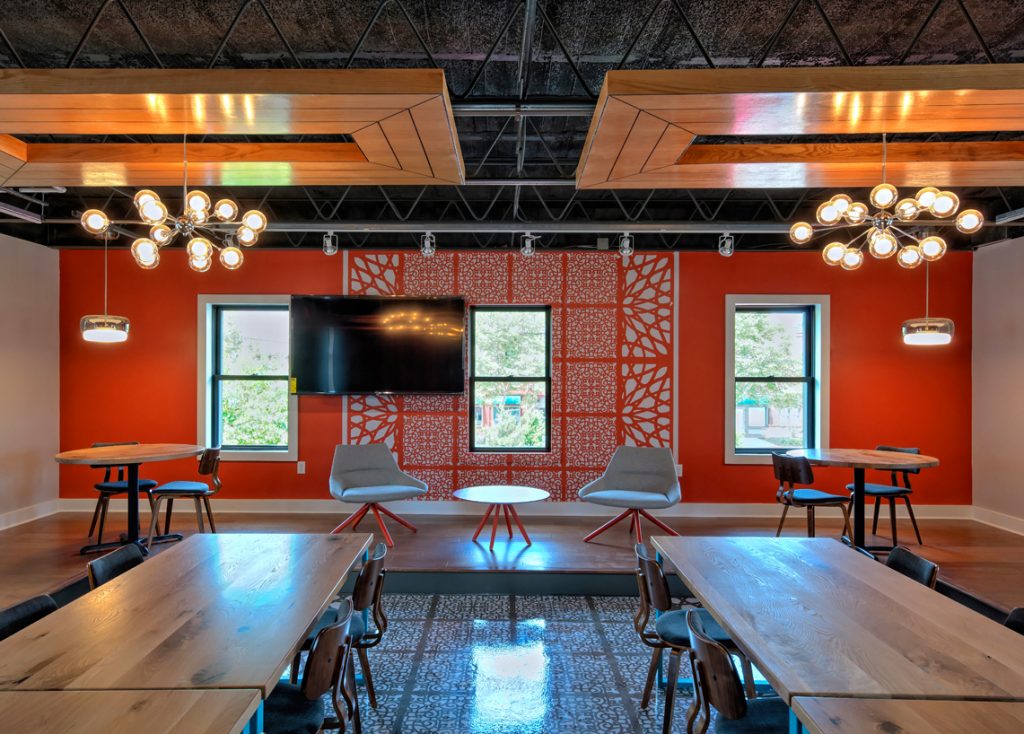Originally published in the July 2020 issue of (614) Magazine

Coworking is collaborative by design, the intersection of independence and interdependence. In many ways, it became the clever alternative to corporate cubicles or home offices, offering the advantages of both without the overhead or isolation.
But like every industry built around bringing people together, the climb now seems more steep for businesses based on communal space when the world and the way we work still seems so far apart. COhatch, among the first such endeavors in Central Ohio, is focused on the future of work, and the ways in which coworking won’t simply facilitate a return to so-called normal, but may become the new standard.
“COhatch was built by small business owners. We’re not this large company that sits back and just looks at spreadsheets asking each other how to optimize,” explained CEO Matt Davis, who remains reluctant when it comes to the “coworking” moniker, considering their larger mission beyond shared square footage. “We were also a group of friends trying to find a better way for our customers to live a balanced life.”
Anyone who has longingly hoped for years to work from home has probably had some buyers remorse in the past few months. That looming pile of laundry and sink full of dishes are the silent distractions companies have always feared would undermine productively. Now even skeptical remote workers are growing sympathetic to such concerns as the lines that define work-life balance become more blurred.
“We pride ourselves in being able to relate with small business owners. We built the kind of environment that allows us to thrive and get the most out of our abilities,” he noted. “So that’s why we’ve spent a lot of time trying to build spaces in the heart of communities where people live. If you live in Dublin, you may want to work in Dublin, not downtown.”
Dublin isn’t an arbitrary example. COhatch has quickly grown to five offices in Central Ohio, with Easton and Dublin among their latest, a new location near Dayton, and expansion into Cleveland, Cincinnati, and Indianapolis already underway. But these also aren’t cookie-cutter concepts. Their original Worthington locations were once a library and a hardware store, and the Polaris space is a former pub. “The Market” in Springfield is the reimagination of a century-old public market now featuring fresh produce, a shared kitchen, and local eateries as well as open and private office space. COhatch doesn’t cover up their character. They embrace it, incorporating it into the brand.
“We’re launching a whole new marketplace where members can sell goods and services. You can advertise or fund your startup. Everyone loves the whole buy local movement, but no one ever really says support your local freelancer,” Davis explained. “So we want to try to get back to smaller communities and build tools to make small businesses more visible and relevant. I actually don’t like being called a coworking space because we’re so much more. Nothing is really out of scope for us.”
Ongoing costs and loss of corporate culture are also serious concerns among even established businesses, once flush now facing an uncertain recovery. Reducing expense through an innovative approach to space was already an advantage COhatch had in its favor, now with newfound value among traditional enterprises of every size.
“We introduced our ‘No Small Business Left Behind’ campaign with a 75 percent discount for the first month, 50 percent the second month, and a 25 percent discount the third month. We also have a 50 percent reduced cost guarantee for large companies,” he explained. “It’s not going to be a 20,000 square-foot dedicated office space. It could be two private meeting spaces on each side of town with a creative lab and 35 coworking passes. But if you’re willing to rethink how you want to work, we’re willing to create something that fits.”
Supporting philanthropic efforts remains a crucial part of their own culture, more so with the current crisis pushing donations to unprecedented lows for many charitable organizations. Dozens of nonprofits also call COhatch home, leveraging evening meeting space and their network of members.There’s also a remodeled, vintage Airstream already used by local charities for mobile legal clinics, résumé writing workshops, even free haircuts for those in need.
“We’re trying to help businesses and nonprofits rebuild together. We need people doing good things, and we can’t let them fail,” Davis explained. “I’m blown away by how many of our members are active in philanthropy. Our nonprofit scholarships are probably one the most rewarding things we have done. It helps us extend our mission of a balanced life into the communities where we work.” ▩
For more on memberships, amenities, and locations, visit cohatch.com